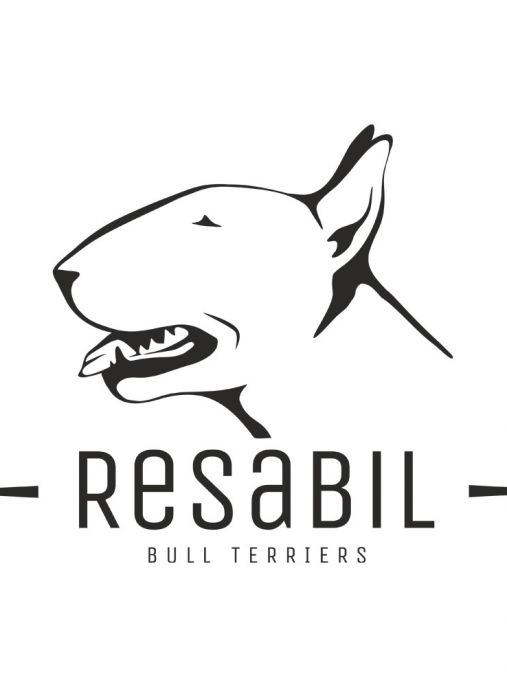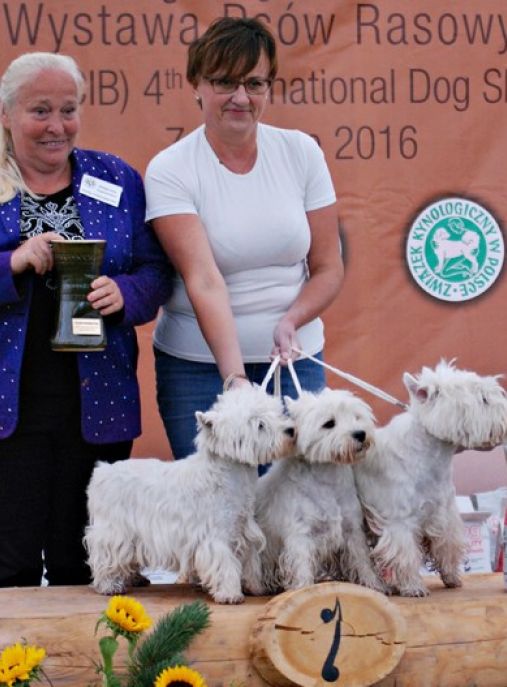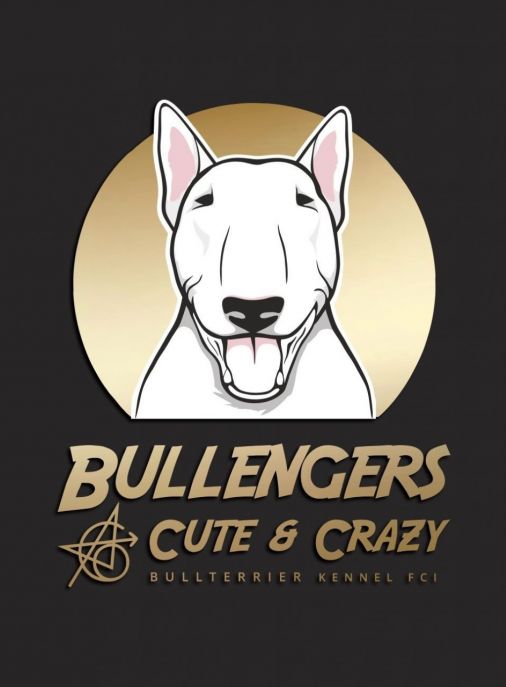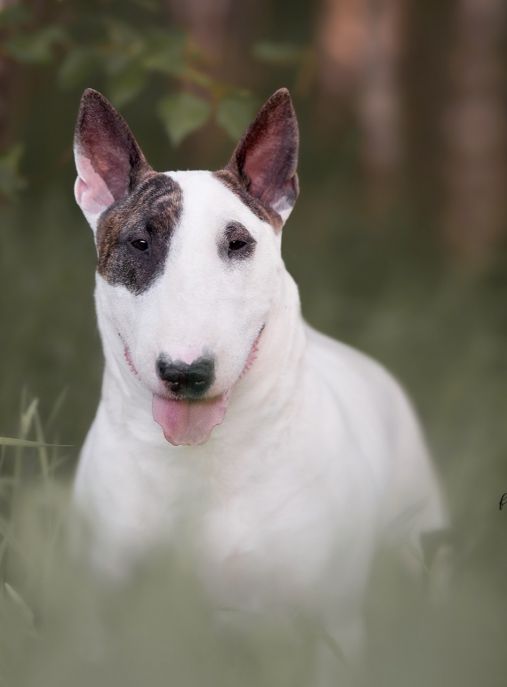The Bull Terrier is a unique and distinctive breed known for its muscular build, egg-shaped head, and playful personality. With its strong and sturdy physique, this breed is often recognized as a powerful and agile dog. The Bull Terrier is a medium-sized breed that exudes strength and determination, making it an ideal companion for active individuals or families.
Originating in England during the 19th century, the Bull Terrier was initially bred for dog fighting and vermin control. The breed was developed by crossing the Old English Bulldog with various terrier breeds, including the White English Terrier, to create a dog with a tenacious spirit and a strong prey drive. Over time, the breed's purpose shifted from fighting to becoming a loyal and affectionate family companion.
According to the FCI (Fédération Cynologique Internationale) typology, the Bull Terrier belongs to Group 3: Terriers. This group includes breeds that were originally bred for hunting and controlling vermin. The Bull Terrier is further classified into Section 3: Bull type Terriers, which includes breeds with a muscular build and a distinctive head shape.
The Bull Terrier is a versatile breed that can adapt to various lifestyles. They are known for their loyalty, intelligence, and playful nature, making them excellent companions for active individuals or families with older children. However, due to their strong prey drive and potential for dog aggression, early socialization and training are essential to ensure a well-behaved and well-adjusted Bull Terrier.
In terms of physical characteristics, the Bull Terrier typically weighs between 50 to 70 pounds (22 to 31 kilograms) and stands at a height of 21 to 22 inches (53 to 56 centimeters) at the shoulder. Their distinctive head is egg-shaped, with small, triangular-shaped eyes that give them a mischievous and alert expression. The breed's coat is short, dense, and comes in a variety of colors, including white, brindle, black, and tan.
The average life expectancy of a Bull Terrier is around 10 to 12 years. However, with proper care, nutrition, and regular exercise, some Bull Terriers have been known to live well into their teens. Like any breed, Bull Terriers are prone to certain health issues, including deafness, heart problems, and skin allergies. Regular veterinary check-ups and a balanced diet are crucial to maintaining their overall health and well-being.
One interesting fact about Bull Terriers is their affinity for human companionship. They are known to be highly affectionate and thrive on human interaction. They are often described as "clowns" due to their playful and entertaining nature. Bull Terriers are also known for their strong jaw strength, which can be seen in their ability to chew through toys and other objects. Providing them with appropriate chew toys and mental stimulation is essential to prevent destructive behavior.
In conclusion, the Bull Terrier is a breed with a rich history and distinctive physical characteristics. From its origins as a fighting dog to its transformation into a loyal family companion, the Bull Terrier has proven to be a versatile and adaptable breed. With their playful nature, loyalty, and unique appearance, Bull Terriers make excellent companions for those who appreciate their strength, intelligence, and affectionate nature.
The Bull Terrier, with its distinctive egg-shaped head and muscular build, is a breed known for its unique character and unwavering loyalty. These dogs possess a combination of strength, intelligence, and playfulness that sets them apart from other breeds. Understanding their character, behavior, and proper training techniques is crucial for anyone considering bringing a Bull Terrier into their home.
Bull Terriers are renowned for their friendly and outgoing nature. They are highly sociable dogs that thrive on human companionship and are known to form strong bonds with their families. This breed is often described as clownish due to their playful and mischievous demeanor. They have a zest for life and are always ready to engage in activities that challenge their physical and mental abilities.
While Bull Terriers are generally good-natured, they can be stubborn at times. This breed possesses a strong will and independent streak, which can make training a bit challenging. However, with consistent and positive reinforcement techniques, they can be molded into well-behaved and obedient companions.
Early socialization is crucial for Bull Terriers to ensure they grow up to be well-rounded dogs. Exposing them to various people, animals, and environments from a young age will help them develop into confident and friendly adults. It is important to note that Bull Terriers have a strong prey drive, so caution should be exercised when introducing them to smaller animals.
Bull Terriers are known for their high energy levels and require regular exercise to keep them physically and mentally stimulated. Daily walks, playtime, and interactive toys are essential to prevent boredom and destructive behavior. Engaging them in activities that challenge their intelligence, such as puzzle toys or obedience training, can help channel their energy in a positive direction.
When it comes to training, Bull Terriers respond best to positive reinforcement methods. Harsh training techniques or physical punishment can lead to fear or aggression in these sensitive dogs. Consistency, patience, and rewards-based training will yield the best results. Early obedience training is essential to establish boundaries and ensure they grow up to be well-behaved members of society.
Bull Terriers are known for their unwavering loyalty and protective nature towards their families. They make excellent watchdogs and will not hesitate to defend their loved ones if they sense a threat. However, proper socialization is crucial to prevent them from becoming overly protective or aggressive towards strangers.
In conclusion, Bull Terriers are charismatic, playful, and loyal dogs that require proper training, socialization, and exercise to thrive. Their unique character and strong personality make them a beloved breed among dog enthusiasts. With the right approach, these dogs can become loving and well-behaved companions, bringing joy and laughter to their families for years to come.
Bull Terriers are a unique and energetic breed that require specific care to ensure their well-being and happiness. Whether you are a first-time owner or have experience with dogs, understanding the recommended care for Bull Terriers is essential. In this comprehensive guide, we will provide you with tips on how to care for Bull Terriers, what to do, and what not to do to ensure their optimal health and happiness.
1. Exercise: Bull Terriers are highly active dogs that require regular exercise to burn off their energy. Aim for at least one hour of exercise daily, which can include walks, runs, playtime in a securely fenced yard, or engaging in interactive games. Mental stimulation is equally important, so consider puzzle toys or obedience training to keep their minds sharp.
2. Socialization: Early socialization is crucial for Bull Terriers to develop good behavior and adaptability. Expose them to various environments, people, and other animals from a young age. This will help them become well-rounded and confident dogs, reducing the chances of aggression or fearfulness.
3. Training: Bull Terriers are intelligent and eager to please, making them relatively easy to train. Start obedience training early, focusing on basic commands such as sit, stay, and come. Positive reinforcement techniques, such as treats and praise, work best with this breed. Avoid harsh training methods or punishment, as it can lead to fear or aggression.
4. Grooming: Bull Terriers have a short, dense coat that requires minimal grooming. Regular brushing with a soft-bristle brush will help remove loose hair and keep their coat shiny. Bathing should be done as needed, typically every 6-8 weeks, using a mild dog shampoo. Additionally, check their ears weekly for any signs of infection and trim their nails regularly.
5. Health Care: Bull Terriers are generally healthy dogs, but they may be prone to certain health issues. Regular veterinary check-ups are essential to monitor their overall health, vaccinations, and preventive care. Common health concerns in this breed include deafness, heart problems, skin allergies, and kidney disease. Be aware of these potential issues and consult with your vet for appropriate preventive measures.
6. Diet: A balanced and nutritious diet is crucial for Bull Terriers to maintain optimal health. Feed them high-quality dog food that is appropriate for their age, size, and activity level. Avoid overfeeding, as Bull Terriers can easily gain weight, which can lead to joint problems. Consult with your veterinarian to determine the right portion sizes and feeding schedule for your dog.
7. Mental Stimulation: Bull Terriers are intelligent and curious dogs that require mental stimulation to prevent boredom and destructive behavior. Provide them with interactive toys, puzzle games, and rotate their toys regularly to keep them engaged. Engage in regular training sessions or enroll them in dog sports such as agility or obedience trials to keep their minds sharp.
8. Safety: Bull Terriers are known for their mischievous and curious nature, so it's important to ensure their safety. Secure your yard with a sturdy fence to prevent them from escaping. Keep harmful substances, toxic plants, and small objects out of their reach. Supervise them around children and other pets to prevent any potential conflicts.
What not to do:
1. Do not leave Bull Terriers alone for extended periods. They thrive on human companionship and can become anxious or develop destructive behaviors if left alone for too long.
2. Avoid rough play or encouraging aggressive behavior. Bull Terriers can be prone to dog aggression, so it's important to discourage any aggressive tendencies from an early age.
3. Do not skip regular exercise. Lack of physical activity can lead to obesity and behavioral problems in Bull Terriers.
4. Avoid overfeeding or feeding them table scraps. Bull Terriers have a tendency to gain weight, which can put strain on their joints and overall health.
5. Do not use harsh training methods or punishment. This can lead to fear, anxiety, and aggression in Bull Terriers.
By following these tips and guidelines, you can provide the best care for your Bull Terrier, ensuring they lead a happy, healthy, and fulfilling life. Remember, each dog is unique, so always pay attention to their individual needs and consult with your veterinarian for personalized advice.
The Bull Terrier, a breed known for its distinctive appearance and muscular build, comes in a variety of colors. However, one of the most common and iconic colors seen in Bull Terriers is pure white. The white coat of a Bull Terrier is truly a sight to behold, exuding elegance, strength, and grace.
The white color of a Bull Terrier's coat is often described as being crisp and clean, resembling freshly fallen snow. It is a pure, brilliant white that stands out in any setting, making these dogs easily recognizable. The coat is typically short and dense, giving it a smooth and glossy appearance.
One of the striking features of a white Bull Terrier is its pigmentation. The nose, lips, and eye rims are usually black, which creates a beautiful contrast against the white coat. This black pigmentation adds depth and definition to the dog's face, enhancing its overall expression and giving it a unique charm.
The eyes of a white Bull Terrier are dark and piercing, often appearing almost black. They are small and triangular in shape, giving the dog an alert and intelligent look. The eyes are set deep into the skull, which contributes to the breed's distinctive appearance.
Another characteristic of a white Bull Terrier is its muscular build. These dogs have a well-developed, athletic physique, with a deep chest and strong, sturdy legs. The white coat accentuates their muscularity, giving them a powerful and robust appearance.
Despite the elegance and beauty of their white coat, Bull Terriers do require regular grooming to keep them looking their best. Their short hair is relatively easy to maintain, but they do shed moderately throughout the year. Regular brushing helps to remove loose hair and keep their coat in good condition.
In addition to the pure white color, Bull Terriers can also come in other colors such as brindle, fawn, or tricolor. However, it is the white coat that is most commonly associated with this breed and is often the first image that comes to mind when thinking of a Bull Terrier.
Overall, the white color of a Bull Terrier's coat is a defining characteristic of this breed. It adds to their regal and powerful presence, making them stand out in a crowd. Whether they are running in the park or lounging at home, the white Bull Terrier is a true vision of beauty and strength.
The health of Bull Terrier dogs is of utmost importance to ensure their overall well-being and longevity. These dogs are generally robust and sturdy, but like any other breed, they are prone to certain health issues. Understanding the common diseases and taking appropriate care can significantly contribute to maintaining their health.
One of the most prevalent health concerns in Bull Terriers is deafness. This breed is genetically predisposed to congenital deafness, which can affect one or both ears. Regular hearing tests should be conducted, and if deafness is detected, it is essential to provide extra care and attention to ensure their safety.
Another common health issue in Bull Terriers is skin allergies. These dogs are prone to various skin conditions, including atopic dermatitis and contact allergies. Regular grooming, including bathing with hypoallergenic shampoos, can help alleviate these issues. Additionally, a balanced diet with high-quality ingredients can strengthen their immune system and reduce the risk of allergies.
Bull Terriers are also susceptible to certain genetic disorders, such as patellar luxation and hip dysplasia. Patellar luxation occurs when the kneecap dislocates, causing lameness and discomfort. Hip dysplasia, on the other hand, is a condition where the hip joint doesn't develop properly, leading to pain and mobility issues. Regular veterinary check-ups and appropriate exercise can help detect and manage these conditions.
Heart disease is another concern in Bull Terriers, with dilated cardiomyopathy being the most common. This condition affects the heart's ability to pump blood efficiently, leading to symptoms like coughing, fatigue, and difficulty breathing. Regular cardiac screenings and a heart-healthy diet can aid in managing this disease.
Additionally, Bull Terriers are prone to developing kidney disease, which can be caused by various factors, including genetics, infections, or toxins. Regular monitoring of kidney function through blood and urine tests can help detect any abnormalities early on. Providing a balanced diet, access to fresh water, and avoiding exposure to harmful substances can help maintain kidney health.
To care for the health of Bull Terriers, regular exercise is crucial. These dogs have high energy levels and require daily physical activity to prevent obesity and keep them mentally stimulated. Mental enrichment, such as puzzle toys and obedience training, can also contribute to their overall well-being.
Proper nutrition is vital for Bull Terriers' health. Feeding them a high-quality, balanced diet that meets their specific nutritional needs is essential. Avoiding overfeeding and providing appropriate portion sizes can prevent weight gain and associated health issues.
Regular veterinary check-ups are crucial for early detection and prevention of any potential health problems. Vaccinations, parasite prevention, and dental care should be part of their routine healthcare regimen. Regular grooming, including nail trimming, ear cleaning, and dental hygiene, is also important for their overall health and hygiene.
In conclusion, while Bull Terriers are generally healthy dogs, they are prone to certain health issues that require careful attention. By being aware of the common diseases and taking appropriate preventive measures, such as regular veterinary care, proper nutrition, exercise, and grooming, Bull Terrier owners can ensure their beloved pets lead a healthy and happy life.
The Bull Terrier is a strong and muscular breed known for its playful and energetic nature. To ensure their overall health and well-being, it is crucial to provide them with a balanced and nutritious diet. Proper nutrition plays a vital role in maintaining their energy levels, promoting healthy growth, and preventing various health issues. Here is an extensive description of the nutrition requirements for Bull Terrier dogs, along with advice on feeding and what to avoid.
Protein is an essential component of a Bull Terrier's diet as it helps in muscle development and repair. High-quality animal-based proteins like chicken, beef, fish, and lamb should form the foundation of their meals. Look for dog food brands that list meat as the primary ingredient and avoid those containing meat by-products or fillers.
Carbohydrates are a valuable source of energy for Bull Terriers. Opt for complex carbohydrates such as brown rice, sweet potatoes, and whole grains. These provide a steady release of energy and help maintain stable blood sugar levels. Avoid foods with excessive amounts of corn, wheat, or soy, as these can cause allergies or digestive issues in some dogs.
Fats are another crucial component of a Bull Terrier's diet. Healthy fats like omega-3 and omega-6 fatty acids support their skin and coat health, promote brain development, and aid in nutrient absorption. Look for dog foods that contain sources of healthy fats like fish oil, flaxseed, or chicken fat.
Vitamins and minerals are essential for a Bull Terrier's overall health and immune system. A well-balanced diet should include a variety of fruits and vegetables, which provide essential vitamins and minerals. Some safe options include carrots, spinach, blueberries, and apples. However, avoid feeding them grapes, raisins, onions, garlic, or any other toxic foods that can be harmful to dogs.
Feeding guidelines for Bull Terriers may vary depending on their age, activity level, and overall health. Puppies require more frequent meals, typically three to four times a day, to support their rapid growth. As they mature, you can gradually transition to two meals a day. It is important to monitor their weight and adjust portion sizes accordingly to prevent obesity.
Avoid overfeeding your Bull Terrier, as they have a tendency to gain weight easily. Obesity can lead to various health problems, including joint issues and heart disease. Stick to the recommended portion sizes mentioned on the dog food packaging and consult with your veterinarian for personalized feeding advice.
In addition to a balanced diet, fresh water should always be available for your Bull Terrier. Hydration is crucial for their overall health and helps maintain proper organ function.
Lastly, it is important to note that every dog is unique, and their nutritional needs may vary. Regular visits to the veterinarian are essential to monitor their health and make any necessary adjustments to their diet. By providing a well-balanced and nutritious diet, you can ensure that your Bull Terrier remains healthy, happy, and full of energy.












































